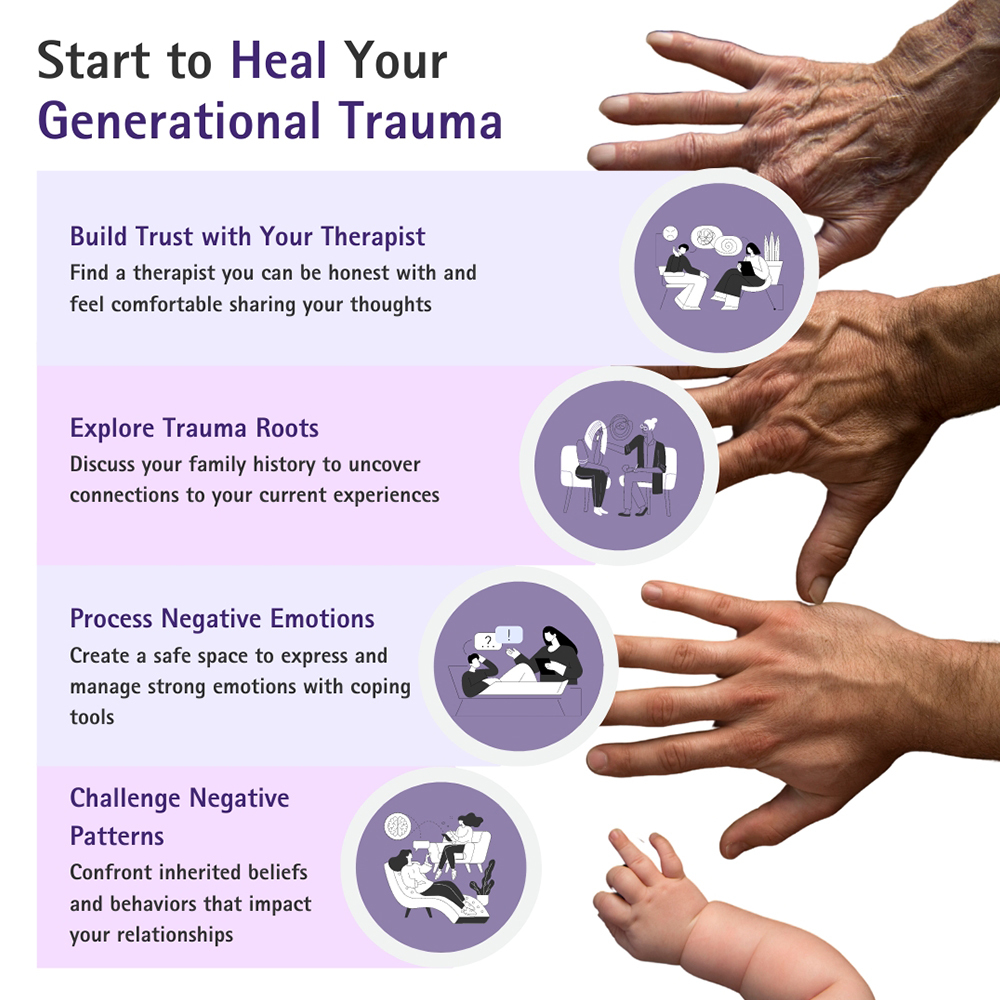Understanding Generational Trauma
Definition and Causes
Trauma can be physical, mental, or emotional. Generational trauma occurs when trauma effects are passed down through generations, even without the individual directly experiencing the traumatic event.
There are several theories on how trauma is passed down. Trauma does not only occur because of an event or events but also because of the negative beliefs that are adopted after the event. One theory is that generational trauma is these negative beliefs passed down over generations.
Another theory is that trauma can be passed down genetically. Different factors, like whether the mother or father experienced the trauma or the age at which the trauma occurred, can contribute to different effects on the child.
There isn’t much research on how trauma is passed down genetically at this time due to the challenges in doing these types of studies in humans.
Call to schedule an appointment for generational trauma therapy today!
(561) 363-7994Signs and Symptoms
You can begin to assess on your own if you notice some signs and symptoms of generational trauma in your family. However, it is important to remember that differences among families, as well as cultural and societal factors, need to be taken into account.
While a self-assessment can be a good start, a therapist would need to conduct a comprehensive evaluation of your family trauma history and your individual effects.

Some indicators of generational trauma include:
- Family history of domestic violence, substance use, or dysfunctional relationships
- History of unresolved grief or depression across generations
- Emotional dysregulation, anxiety, or depression
- Confusion regarding identity and heritage
- Physical health issues due to heightened levels of stress
- Families that believe vulnerability is a weakness and discourage children from sharing their feelings
- Families in which there is pressure to reach perfection
- Mistrust of others due to a belief that suspicion is necessary for survival
- A belief that life is suffering
Trauma effects on your mental health are complex and can be difficult to identify within your own family. Family trauma therapy in West Palm Beach can help bring awareness to the specific signs present in your family and create a plan for change.
The Impact of Generational Trauma
Individual Impact
You may have noticed secrecy around your family history from the time you were a child. As you get older, you may notice your parents exhibiting symptoms of trauma such as emotional dysregulation, substance use, or anxiety.
As you become an adult, you may begin to experience your own mental, emotional, and physical health issues. Feelings of shame and confusion can lead to being disconnected from your family. You may experience consequences such as relationship issues, substance use, and even self-harm.
Family Impact
When your family has experienced trauma throughout the generations, such as war, poverty, or physical or sexual abuse, you may have noticed the fear and uncertainty in your family. Your parents may have fought often, and as a child, you were caught in between them. You begin to experience the difficulty your family has in communicating with each other. They may seem emotionally distant from each other, which continues to propel the cycles of dysfunction.
Healing Generational Trauma
Importance of Therapy
Awareness is the first step in minimizing post-traumatic stress disorder (PTSD) from family trauma. Once you seek treatment, you will become aware of the causes and effects your family trauma has on your life and can begin to heal. Cognitive behavioral therapy can improve your mental health by identifying your family patterns, developing coping skills, and decreasing your symptoms of anxiety and depression from trauma.
After working with a trauma therapist, it will be important for you to continue practicing self-care. Your counselor can help you find what works best for you. Establishing structures and routines can help provide stability in your life to minimize the effects of family trauma.

Start to Heal Your Generational Trauma
Here is how you can start to heal your generational trauma:
- Build a trusting relationship with your therapist. The cornerstone of healing is trust between you and your therapist. It’s important to find a therapist with whom you can be completely honest and feel comfortable sharing your honest thoughts and feelings.
- Dig deep to find the root of your trauma symptoms. Your therapist may ask you about your family history and help you find connections to your current experiences.
- Process and release strong negative emotions. Your therapist can create a safe space for you to feel and express these feelings in a way that leads to healing. Your therapist will provide you with coping tools to manage difficult emotions.
- Identifying and challenging your negative beliefs, behaviors, and relationship patterns. Your therapist will provide you with information and specific strategies to be able to do this.
- Break the silence. Therapy can help you find healthy ways to communicate your family history with the future generation.
You can heal generational trauma with the support and guidance of your therapist.
Generational Trauma Therapy or Virtual Consultations
Therapeutic Approaches
PTSD from generational trauma affects not only the individual but the entire family. That’s why healing the entire family is important. Family involvement can promote improved communication and a more supportive family dynamic. Our mental health services include family sessions with any member of your family who is interested in joining the healing process.
Some options for evidence-based therapeutic approaches for generational trauma include:
- Narrative therapy: Process your family history and learn to view the problem in a different light.
- Internal family systems (IFS): Identify the different parts of yourself and access the “core” calm, compassionate, and wise part of yourself.
- Eye movement desensitization and reprocessing (EMDR): Remove the strong negative emotions related to your family trauma through bilateral stimulation.
- Childhood trauma therapy: Process your childhood abuse or neglect to improve your self-esteem and emotional well-being.
- Group therapy: Connect with others who are experiencing similar issues and offer support.
If you’d like to learn more about which therapeutic option is right for you, contact us today to speak to a therapist.
Core Components of Family Trauma Treatment
Intergenerational trauma therapy consists of some main components that are vital to your healing. Some of these include:
- Therapeutic relationship: Building trust between a therapist and an individual is the foundation of healing from trauma. It is crucial to find a therapist you can connect with and feel comfortable with.
- Psychoeducation: Therapy is a great place to learn what trauma is and where it comes from to help understand your feelings and experiences and reduce confusion.
- Safety and stabilization: Your therapist will help create a safe and supportive environment. This may involve establishing routines, setting boundaries, and promoting open communication to enhance emotional safety.
Effective family therapy addresses the nuances of family trauma and assists the family in fostering resilience and healing across generations.
Find a Good Psychotherapist for Generational Trauma
You can find a good psychologist or therapist in West Palm Beach by making sure your counselor is certified in trauma therapy.
Once you do that, you may want to make sure you have a good rapport with your therapist. This person can be someone you relate to, trust, and who doesn’t judge.
Benefits of Therapy
Therapy is a great option for someone who wants to challenge the cycles of generational trauma, improve their own symptoms, and pass on a healthier way of living to their children.
The benefits of therapy for generational trauma include:
- Awareness of patterns in your family
- Improved emotional regulation
- Learn coping skills
- Improve relationships
- Reduce stress, anxiety, and depression
- Break the cycle of trauma
The events that happened to our families or to us in the past are not our fault. But it is our responsibility to improve our own lives and care for ourselves.
Effectiveness of Family Trauma Therapy
According to research, 77- 100% of patients experienced a reduction in symptoms after participating in trauma therapy. Working with a family therapist has been proven to improve the emotional and mental health of most patients.
At the Trauma Therapy Center, our dedicated team of trauma therapists in West Palm Beach, FL, is committed to helping you heal from generational trauma. With certified clinical trauma expertise and EMDR training, we provide specialized family trauma therapy to address deep-rooted wounds and rebuild connections. Begin your transformative journey today with in-person or online therapy and experience the power of healing with us.

